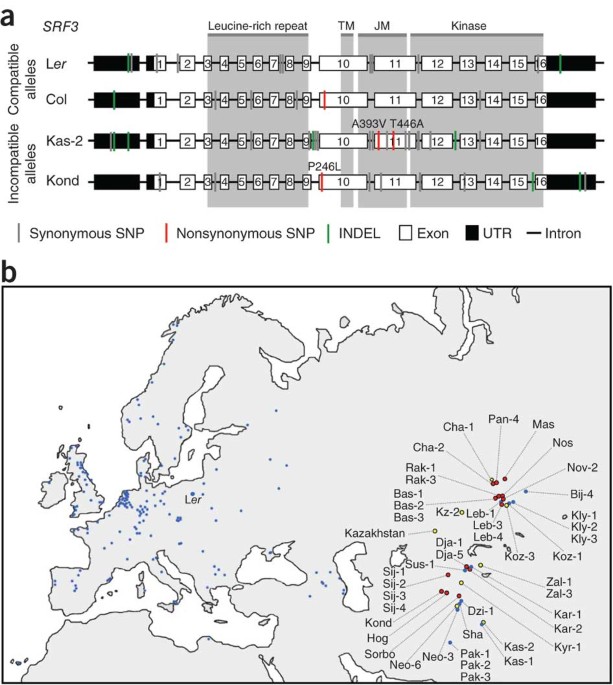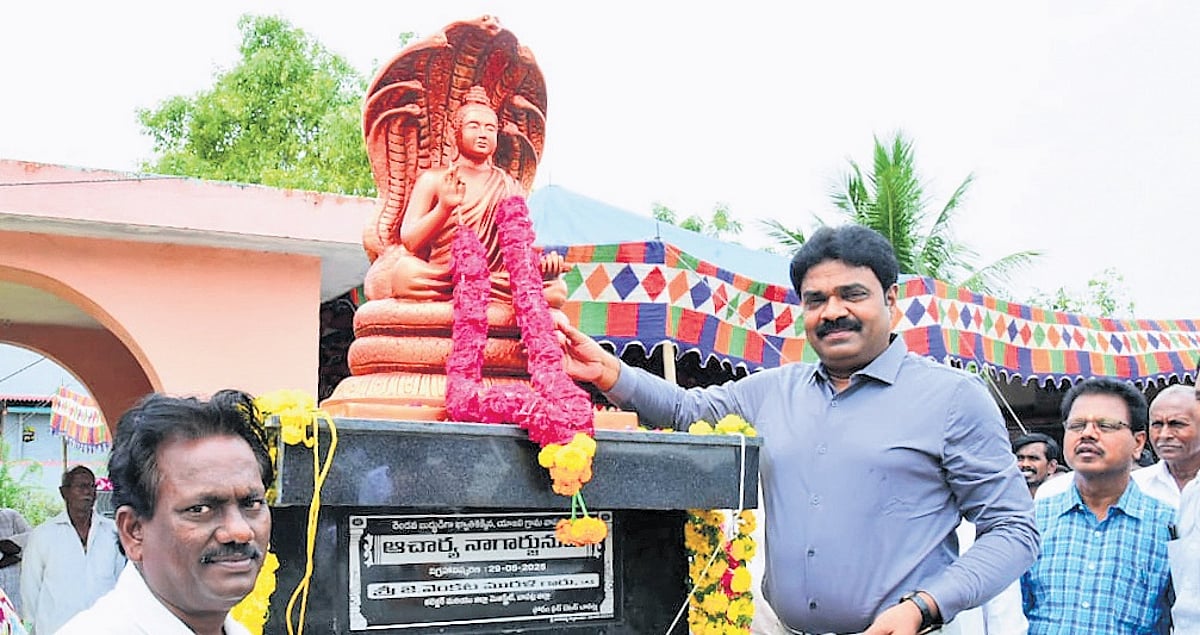
- Select a language for the TTS:
- UK English Female
- UK English Male
- US English Female
- US English Male
- Australian Female
- Australian Male
- Language selected: (auto detect) - EN
Play all audios:
ABSTRACT Accumulation of genetic incompatibilities within species can lead to reproductive isolation and, potentially, speciation. In this study, we show that allelic variation at _SRF3_
(_Strubbelig Receptor Family 3_), encoding a receptor-like kinase, conditions the occurrence of incompatibility between _Arabidopsis thaliana_ accessions. The geographical distribution of
_SRF3_ alleles reveals that allelic forms causing epistatic incompatibility with a Landsberg _erecta_ allele at the _RPP1_ resistance locus are present in _A. thaliana_ accessions in central
Asia. Incompatible _SRF3_ alleles condition for an enhanced early immune response to pathogens as compared to the resistance-dampening effect of compatible _SRF3_ forms in isogenic
backgrounds. Variation in disease susceptibility suggests a basis for the molecular patterns of a recent selective sweep detected at the _SRF3_ locus in central Asian populations. Access
through your institution Buy or subscribe This is a preview of subscription content, access via your institution ACCESS OPTIONS Access through your institution Subscribe to this journal
Receive 12 print issues and online access $209.00 per year only $17.42 per issue Learn more Buy this article * Purchase on SpringerLink * Instant access to full article PDF Buy now Prices
may be subject to local taxes which are calculated during checkout ADDITIONAL ACCESS OPTIONS: * Log in * Learn about institutional subscriptions * Read our FAQs * Contact customer support
SIMILAR CONTENT BEING VIEWED BY OTHERS SINGLE AMINO ACID CHANGE ALTERS SPECIFICITY OF THE MULTI-ALLELIC WHEAT STEM RUST RESISTANCE LOCUS _SR9_ Article Open access 14 November 2023 GENOMICS
ACCELERATED ISOLATION OF A NEW STEM RUST AVIRULENCE GENE–WHEAT RESISTANCE GENE PAIR Article 22 July 2021 SELF-COMPATIBILITY IN PEACH [_PRUNUS PERSICA_ (L.) BATSCH]: PATTERNS OF DIVERSITY
SURROUNDING THE _S_-LOCUS AND ANALYSIS OF SFB ALLELES Article Open access 01 October 2020 ACCESSION CODES ACCESSIONS ARRAYEXPRESS * E-MEXP-2569 NCBI REFERENCE SEQUENCE * GU570412 * GU570413
* GU571158 * HM538833 * HM539307 REFERENCES * Rieseberg, L.H. & Willis, J.H. Plant speciation. _Science_ 317, 910–914 (2007). Article CAS PubMed PubMed Central Google Scholar *
Bomblies, K. Doomed lovers: mechanisms of isolation and incompatibility in plants. _Annu. Rev. Plant Biol._ 61, 109–124 (2010). Article CAS PubMed Google Scholar * Dobzhansky, T.
_Genetics and the Origin of Species_ (Columbia University Press, New York, 1937). * Muller, H. Isolating mechanisms, evolution, and temperature. _Biol. Symp._ 6, 71–124 (1942). Google
Scholar * Bomblies, K. & Weigel, D. _Arabidopsis_ and relatives as models for the study of genetic and genomic incompatibilities. _Philos. Trans. R. Soc. Lond. B. Biol. Sci._ 365,
1815–1823 (2010). Article PubMed PubMed Central Google Scholar * Alcázar, R., García, A.V., Parker, J.E. & Reymond, M. Incremental steps toward incompatibility revealed by
_Arabidopsis_ epistatic interactions modulating salicylic acid pathway activation. _Proc. Natl. Acad. Sci. USA_ 106, 334–339 (2009). Article PubMed Google Scholar * Bikard, D. et al.
Divergent evolution of duplicate genes leads to genetic incompatibilities within _A. thaliana_. _Science_ 323, 623–626 (2009). Article CAS PubMed Google Scholar * Bomblies, K. et al.
Autoimmune response as a mechanism for a Dobzhansky-Muller-type incompatibility syndrome in plants. _PLoS Biol._ 5, e236 (2007); comment 5, e262 (2007). Article PubMed PubMed Central
Google Scholar * Eyüboglu, B. et al. Molecular characterisation of the STRUBBELIG-RECEPTOR FAMILY of genes encoding putative leucine-rich repeat receptor-like kinases in _Arabidopsis
thaliana_. _BMC Plant Biol._ 7, 16 (2007). Article PubMed PubMed Central Google Scholar * Platt, A. et al. The scale of population structure in _Arabidopsis thaliana_. _PLoS Genet._ 6,
e1000843 (2010). Article PubMed PubMed Central Google Scholar * el-Lithy, M.E. et al. New _Arabidopsis_ recombinant inbred line populations genotyped using SNPWave and their use for
mapping flowering-time quantitative trait loci. _Genetics_ 172, 1867–1876 (2006). Article CAS PubMed PubMed Central Google Scholar * Jones, J.D.G. & Dangl, J.L. The plant immune
system. _Nature_ 444, 323–329 (2006). Article CAS PubMed Google Scholar * Benschop, J.J. et al. Quantitative phosphoproteomics of early elicitor signaling in _Arabidopsis_. _Mol. Cell.
Proteomics_ 6, 1198–1214 (2007). Article CAS PubMed Google Scholar * Chinchilla, D., Bauer, Z., Regenass, M., Boller, T. & Felix, G. The _Arabidopsis_ receptor kinase FLS2 binds
flg22 and determines the specificity of flagellin perception. _Plant Cell_ 18, 465–476 (2006). Article CAS PubMed PubMed Central Google Scholar * Ichimura, K., Casais, C., Peck, S.C.,
Shinozaki, K. & Shirasu, K. MEKK1 is required for MPK4 activation and regulates tissue-specific and temperature-dependent cell death in _Arabidopsis_. _J. Biol. Chem._ 281, 36969–36976
(2006). Article CAS PubMed Google Scholar * Suarez-Rodriguez, M.C. et al. MEKK1 is required for flg22-induced MPK4 activation in _Arabidopsis_ plants. _Plant Physiol._ 143, 661–669
(2007). Article CAS PubMed PubMed Central Google Scholar * Petersen, M. et al. _Arabidopsis_ MAP kinase 4 negatively regulates systemic acquired resistance. _Cell_ 103, 1111–1120
(2000). Article CAS PubMed Google Scholar * Brodersen, P. et al. _Arabidopsis_ MAP kinase 4 regulates salicylic acid- and jasmonic acid/ethylene-dependent responses via EDS1 and PAD4.
_Plant J._ 47, 532–546 (2006). Article CAS PubMed Google Scholar * Tsuda, K., Sato, M., Glazebrook, J., Cohen, J.D. & Katagiri, F. Interplay between MAMP-triggered and SA-mediated
defense responses. _Plant J._ 53, 763–775 (2008). Article CAS PubMed Google Scholar * Yuan, J. & He, S.Y. The _Pseudomonas syringae_ Hrp regulation and secretion system controls the
production and secretion of multiple extracellular proteins. _J. Bacteriol._ 178, 6399–6402 (1996). Article CAS PubMed PubMed Central Google Scholar * Fay, J.C. & Wu, C.I.
Hitchhiking under positive Darwinian selection. _Genetics_ 155, 1405–1413 (2000). CAS PubMed PubMed Central Google Scholar * Zeng, K., Fu, Y.X., Shi, S.H. & Wu, C.I. Statistical
tests for detecting positive selection by utilizing high-frequency variants. _Genetics_ 174, 1431–1439 (2006). Article PubMed PubMed Central Google Scholar * Bakker, E.G., Toomajian, C.,
Kreitman, M. & Bergelson, J. A genome-wide survey of _R_ gene polymorphisms in _Arabidopsis_. _Plant Cell_ 18, 1803–1818 (2006). Article CAS PubMed PubMed Central Google Scholar *
Mishina, T.E. & Zeier, J. Pathogen-associated molecular pattern recognition rather than development of tissue necrosis contributes to bacterial induction of systemic acquired resistance
in _Arabidopsis_. _Plant J._ 50, 500–513 (2007). Article CAS PubMed Google Scholar * Aarts, N. et al. Different requirements for _EDS1_ and _NDR1_ by disease resistance genes define at
least two _R_ gene-mediated signaling pathways in _Arabidopsis_. _Proc. Natl. Acad. Sci. USA_ 95, 10306–10311 (1998). Article CAS PubMed PubMed Central Google Scholar * Feys, B.J.,
Moisan, L.J., Newman, M.A. & Parker, J.E. Direct interaction between the _Arabidopsis_ disease resistance signaling proteins, EDS1 and PAD4. _EMBO J._ 20, 5400–5411 (2001). Article CAS
PubMed PubMed Central Google Scholar * Bechtold, N. & Pelletier, G. In planta Agrobacterium mediated transformation of adult _Arabidopsis thaliana_ plants by vacuum infiltration.
_Methods Mol. Biol._ 82, 259–266 (1998). CAS PubMed Google Scholar * Koncz, C. & Schell, J. The promoter of Tl-DNA Gene 5 controls the tissue-specific expression of chimeric genes
carried by a novel type of Agrobacterium binary vector. _Mol. Gen. Genet._ 204, 383–396 (1986). Article CAS Google Scholar * Alonso, J.M. et al. Genome-wide insertional mutagenesis of
_Arabidopsis thaliana_. _Science_ 301, 653–657 (2003). Article PubMed Google Scholar * Pritchard, J.K., Stephens, M. & Donnelly, P. Inference of population structure using multilocus
genotype data. _Genetics_ 155, 945–959 (2000). CAS PubMed PubMed Central Google Scholar * Evanno, G., Regnaut, S. & Goudet, J. Detecting the number of clusters of individuals using
the software STRUCTURE: a simulation study. _Mol. Ecol._ 14, 2611–2620 (2005). Article CAS PubMed Google Scholar * Tornero, P. & Dangl, J.L. A high-throughput method for quantifying
growth of phytopathogenic bacteria in _Arabidopsis thaliana_. _Plant J._ 28, 475–481 (2001). Article CAS PubMed Google Scholar * Feys, B.J. et al. _Arabidopsis_ SENESCENCE-ASSOCIATED
GENE101 stabilizes and signals within an ENHANCED DISEASE SUSCEPTIBILITY1 complex in plant innate immunity. _Plant Cell_ 17, 2601–2613 (2005). Article CAS PubMed PubMed Central Google
Scholar * Häweker, H. et al. Pattern recognition receptors require N-glycosylation to mediate plant immunity. _J. Biol. Chem._ 285, 4629–4636 (2010). Article PubMed Google Scholar *
Wakeley, J. & Aliacar, N. Gene genealogies in a metapopulation. _Genetics_ 159, 893–905 (2001). CAS PubMed PubMed Central Google Scholar * Thompson, J.D., Higgins, D.G. & Gibson,
T.J. Clustal-W–Improving the sensitivity of progressive multiple sequence alignment through sequence weighting, position-specific gap penalties and weight matrix choice. _Nucleic Acids
Res._ 22, 4673–4680 (1994). Article CAS PubMed PubMed Central Google Scholar * Hudson, R.R. Generating samples under a Wright-Fisher neutral model of genetic variation. _Bioinformatics_
18, 337–338 (2002). Article CAS PubMed Google Scholar Download references ACKNOWLEDGEMENTS We thank C. Alonso-Blanco, V. le Corre, M.H. Hoffmann, K. Schmid, O.A. Rognli and O. Loudet
for providing seed materials. We thank B. Huettel for microarray hybridizations. This work was funded by Deutsche Forschungsgemeinschaft SFB 680 grants (to M.R., J.E.P. and J.d.M.). The
authors also acknowledge the Max Planck Society and an International Max Planck Research School fellowship to A.V.G. AUTHOR INFORMATION Author notes * Ana V García & Jane E Parker
Present address: Department of Plant Microbe Interactions, Max Planck Institute for Plant Breeding Research, Cologne, Germany. Present addresses: Institut Jean-Pierre Bourgin, UMR1318
INRA-AgroParisTech, Institut National de la Recherche Agronomique (INRA) Centre de Versailles-Grignon, Route de St-Cyr (RD10), Versailles Cedex, France (M.R.) and Unité de Recherche en
Génomique Végétale, INRA-Centre National de la Recherche Scientifique-Université Evry Val d'Essonne (CNRS-UEVE), Evry CEdex, France (A.V.G.)., AUTHORS AND AFFILIATIONS * Department of
Plant Breeding and Genetics, Max Planck Institute for Plant Breeding Research, Cologne, Germany Rubén Alcázar, Ilkka Kronholm, Juliette de Meaux, Maarten Koornneef & Matthieu Reymond
Authors * Rubén Alcázar View author publications You can also search for this author inPubMed Google Scholar * Ana V García View author publications You can also search for this author
inPubMed Google Scholar * Ilkka Kronholm View author publications You can also search for this author inPubMed Google Scholar * Juliette de Meaux View author publications You can also search
for this author inPubMed Google Scholar * Maarten Koornneef View author publications You can also search for this author inPubMed Google Scholar * Jane E Parker View author publications You
can also search for this author inPubMed Google Scholar * Matthieu Reymond View author publications You can also search for this author inPubMed Google Scholar CONTRIBUTIONS R.A., M.K.,
J.E.P. and M.R. conceived the study. R.A. performed most of the experimental work with contributions from A.V.G. in the pathogen infection assays. I.K. and J.d.M. performed the computer
analysis and interpretation of Fay and Wu's _H__n_ statistics. M.K. provided accessions and European F2 populations. J.E.P. provided materials for immune analyses. M.R. performed all
statistical analyses. All authors analyzed the data. R.A., J.E.P and M.R. wrote the paper with contributions from all authors. CORRESPONDING AUTHOR Correspondence to Matthieu Reymond. ETHICS
DECLARATIONS COMPETING INTERESTS The authors declare no competing financial interests. SUPPLEMENTARY INFORMATION SUPPLEMENTARY TEXT AND FIGURES Supplementary Figures 1–11 and Supplementary
Tables 1–6 (PDF 1990 kb) RIGHTS AND PERMISSIONS Reprints and permissions ABOUT THIS ARTICLE CITE THIS ARTICLE Alcázar, R., García, A., Kronholm, I. _et al._ Natural variation at Strubbelig
Receptor Kinase 3 drives immune-triggered incompatibilities between _Arabidopsis thaliana_ accessions. _Nat Genet_ 42, 1135–1139 (2010). https://doi.org/10.1038/ng.704 Download citation *
Received: 30 March 2010 * Accepted: 07 October 2010 * Published: 31 October 2010 * Issue Date: December 2010 * DOI: https://doi.org/10.1038/ng.704 SHARE THIS ARTICLE Anyone you share the
following link with will be able to read this content: Get shareable link Sorry, a shareable link is not currently available for this article. Copy to clipboard Provided by the Springer
Nature SharedIt content-sharing initiative







